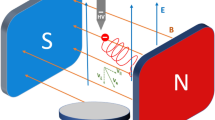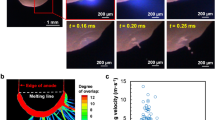Abstract
THE successful interruption of large currents at high voltages has been the subject of considerable research, the general aim being to bring about a low-energy release in the circuit breaker by having a short arcing period. During recent years, attention has been focused on the use of a high-velocity blast of gas to effect consistently rapid interruption and at the same time avoid setting up destructive voltage surges in the circuit. Numerous oscillograms have shown that final interruption takes place towards the end of a half-cycle, and for this reason great interest has been taken in the de-ionizing influences which are active immediately after current zero.
This is a preview of subscription content, access via your institution
Access options
Subscribe to this journal
Receive 51 print issues and online access
$199.00 per year
only $3.90 per issue
Buy this article
- Purchase on Springer Link
- Instant access to full article PDF
Prices may be subject to local taxes which are calculated during checkout
Similar content being viewed by others
References
Kesselring and Kopplemann, Arch. Elektrotech., 30, 75 (1936).
Slepian, Trans. Amer. Inst. Elect. Eng., 60, 162 (1941).
Author information
Authors and Affiliations
Rights and permissions
About this article
Cite this article
O'DOHERTY, J. Diffusion Phenomena in Alternating Current Arcs. Nature 153, 558–559 (1944). https://doi.org/10.1038/153558b0
Issue Date:
DOI: https://doi.org/10.1038/153558b0
Comments
By submitting a comment you agree to abide by our Terms and Community Guidelines. If you find something abusive or that does not comply with our terms or guidelines please flag it as inappropriate.



